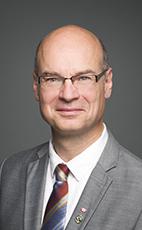Mr. Speaker, today I want to talk about private member's Bill C-393, which was introduced by the member for Montcalm. The bill seeks the support of the House to amend the Canadian Multiculturalism Act so that it would not apply in Quebec.
Diversity is a fundamental and enduring feature of Quebec and Canada. Our society is made up of individuals from different cultures all over the world who have learned over time to respect and accept one another. Canada was the first country in the world to adopt multiculturalism as an official policy in 1971. In 1988, the Canadian Multiculturalism Act affirmed that multiculturalism is a fundamental characteristic of Canadian society. Multiculturalism strengthens Quebec and Canada by fostering an inclusive society in which people of all backgrounds are respected and recognized.
Multiculturalism may be one of the government's official policies, but it is also a concept that is expressly included in and part of the Canadian Charter of Rights and Freedoms. Section 27 states:
This Charter shall be interpreted in a manner consistent with the preservation and enhancement of the multicultural heritage of Canadians.
In a society as diverse as ours, our multiculturalism policy helps preserve our values and the principles of inclusion and diversity. This policy also makes it possible for Quebeckers and Canadians of all backgrounds to make social, economic, cultural and political contributions to our society. It is clear to me that the laws, initiatives and programs that eliminate racism and discrimination support full participation and ensure that institutions reflect the diversity of the people they serve.
Furthermore, these laws, initiatives and programs are essential to creating a more inclusive and respectful society where every person, no matter their ethnic origin, colour or religion, helps build a more just society. The Canadian Multiculturalism Act seeks to build a society where multiculturalism and respect for diversity are fundamental characteristics and values.
This does not mean that differences cannot lead to tensions between individuals, but as we learn to manage these tensions, Quebeckers and Canadians learn to adapt and develop relationships in spite of their differences. We have come to understand that our differences do not have to divide us.
Canada's federal multiculturalism policy and Quebec's interculturalism model have complemented each other and coexisted since the 1970s without causing tension or creating serious problems. Although interculturalism is a provincial model of integration in Quebec, multiculturalism is Canada's federal integration model, as set out in the Canadian Multiculturalism Act, 1988.
There are differences between these two approaches, but the federal multiculturalism system is flexible enough to allow these two approaches to coexist. The approaches put more emphasis on integration and respect for shared civic and democratic values, and as such, both approaches have been contributing to Canada's social fabric since the 1970s.
Quebec and Canada are proof that it is possible for men and women from diverse backgrounds, religions and cultures to live together. We admit that there are problems, and we are working to find solutions, despite our differences. We are showing the world that different people can accept each other, respect each other, and work together to build one of the most open, resilient and creative societies on Earth.
Canadian Heritage's multiculturalism program offers programs and services in support of the Canadian Multiculturalism Act's implementation.
The objectives of the program are to: build an integrated, socially cohesive society; improve the responsiveness of institutions to the needs of a diverse population; and actively engage in discussions on multiculturalism and diversity at the international level.
To that end, the program includes four key areas of activity: grants and contributions; public outreach and promotion; support to federal and public institutions; and international engagement.
It is important for us to continue working together to achieve common objectives for building a strong and inclusive society.
Over the past four decades, multiculturalism has become central to the way Canadians view themselves and their country. They feel that multiculturalism is not only key to their national identity, but a source of pride. We increasingly see our country as being richer for its diversity.
Debates on multiculturalism are necessary ingredients in a democratic society. These are the debates that helped develop Canada's approach to multiculturalism and diversity. In the 1970s, debates were focused on celebrating our differences. In the 1980s, the focus was on managing diversity and now, in 2018, multiculturalism is focused on social inclusion.
The wording of the Canadian Multiculturalism Act is general enough to include new approaches to promoting the act's objectives.
Canadians are proud of their diversity. According to a Statistics Canada study released in 2015, 85% of Canadians believe that ethnic and cultural diversity is a value that Canadians share.
Ultimately, what matters is not what we call our policy framework. What matters is creating a climate that fosters appreciation for the multicultural heritage of all Canadians, who have roots all over the world. It is also important that we create a public space in which everyone can express their confidence and their sense of attachment and belonging to our society, its people and its institutions.

